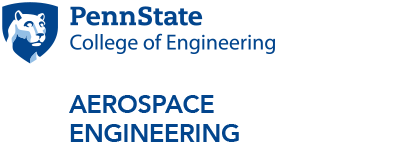
Graduate Degrees and Requirements
The aerospace engineering department offers the following graduate degree options:
- Master of Engineering (M.Eng.)
- Master of Science (M.S.)
- Doctor of Philosophy (Ph.D.)
- Minor in Computational Science
General descriptions for each of these programs are provided below. Detailed descriptions of the requirements specific to each program can be found within the Graduate Studies Guide.
All students in the M.Eng., M.S., and Ph.D. programs must complete the Scholarship and Research Integrity (SARI) program requirements. The SARI program provides graduate students with opportunities to identify, examine, and discuss ethical issues relevant to their disciplines.
The SARI@PSU program is composed of two parts: an online training component (Part 1), and an interactive, discussion-based component (Part 2). The online training provides a common language and understanding of the history and principles of the responsible conduct of research. The discussion-based component provides an opportunity for in-depth exploration of important issues unique to each field of study.
For more information about the SARI program and requirements specific to aerospace engineering graduate students, go to SARI Program Information and Checklist.
One-year, non-thesis Master of Engineering (M.Eng.) in Aerospace Engineering
Application Deadline: We follow a rolling admissions process for the M.Eng. program. Application deadline for Fall enrollment is December 15.
The M.Eng. is a non-thesis professional master’s degree. An intensive one-year, 32-credit program, the M.Eng. requires completion of a capstone experience. This is an ideal program for engineers with bachelor’s degrees who wish to expand their set of career possibilities in aerospace-related fields. It is also pursued by highly qualified students who wish to accelerate progress towards a Ph.D. degree.
Degree Requirements:
- A total of at least 32 credits is required for the degree, including courses in the core requirements
- Restrictions on course credits:
- A minimum of 18 credits of aerospace engineering courses (600-level courses and AERSP 590 do not count towards this total)
- A minimum of 18 credits at the 500 level in addition to two credits in AERSP 590 (Colloquium).
- A maximum of 9 credits at the 400 level
- Satisfactory completion of a capstone course or project (3 credits of EDSGN 558 or a capstone project supervised by a member of the Graduate Faculty, completed while enrolling in AERSP 596, or another graduate systems or vehicle design course)
- Minimum of a 3.0 grade-point average
All courses used to satisfy degree requirements must be technical in nature, i.e., engineering, mathematics, or physical sciences.
Master of Science (M.S.) in Aerospace Engineering
Application Deadline (with or without funding):
August 15, for Spring enrollment
December 15, for Fall enrollment
Spring admission decisions are typically made by mid-October. Fall admission decisions are typically made by mid-March or early April.
The M.S. is a thesis-based master’s degree having a significant research component. It requires a minimum of 30 credits and is designed to be completed in two years. This is an ideal program for an engineer with a bachelor’s degree who wishes to go deeper into research in specific areas of interest. The M.S. may be a terminal degree for students who intend to pursue research-related careers, or it may be a stepping stone en route to a Ph.D. degree.
Degree Requirements:
- A total of at least 32 credits is required for the degree, including courses in the core requirements
- A minimum of 6 thesis credits (600/610)
- A minimum of two credits of AERSP 590 (Colloquium)
- Restrictions on course credits:
- A minimum of 14 credits of aerospace engineering courses (600-level courses do not count towards this total)
- A minimum of 18 credits at the 500 and 600 level combined, at least 8 of these must be at the 500-level.
- A maximum of 6 credits at the 400 level
- Satisfactory completion of an M.S. thesis, including a public presentation
- Minimum of a 3.0 grade-point average
All courses used to satisfy degree requirements must be technical in nature, i.e., engineering, mathematics, or physical sciences.
Doctor of Philosophy (Ph.D.) in Aerospace Engineering
Application Deadline (with or without funding):
August 15, for Spring enrollment
December 15, for Fall enrollment
Spring admission decisions are typically made by mid-October. Fall admission decisions are typically made by mid-March or early April.
The Ph.D. is a thesis-based doctoral degree. It is very strongly research-oriented and is a terminal degree for students who intend to pursue careers in research and development, research management, or university teaching. It is an excellent program for an individual with a master’s degree in engineering, physical science, or mathematics who wishes to pursue a career in academic, governmental, and/or industry research in the field.
Admission to the Ph.D. program requires satisfactory completion of a master’s program in engineering. For information on direct admission to the Ph.D. program, please refer to the Guide to Graduate Studies.
Degree Requirements:
Doctoral students must satisfy the core requirements. Graduate course requirements, in addition to those specified in the core requirements, are set by the candidate’s doctoral committee on an individual basis. In general, there is no specified number of credits for the Ph.D. degree; however, students typically take at least 24 course credits beyond the M.S. degree.
The doctoral dissertation will involve research activity normally exceeding one full year of full-time graduate work equivalent to 30 credits; exact requirements are determined by a student’s doctoral committee.
- Restrictions on course credits:
- A maximum of 6 credits at the 400 level
- Experimental requirement (a student must do one of the following):
- Perform dissertation research having an experimental component
- Serve as Teaching Assistant (TA) for AERSP 305W
- Take a course that emphasizes laboratory measurements and error analysis, such as AERSP 420, AERSP 597-1 (Advanced Experimental Methods), ME 530, ME 536, ME 544, E MCH 506, E MCH 528, or ACS 505
- Perform independent study (1 credit AERSP 596) by arrangement of your advisor. This could involve assisting another graduate student with experimental measurements, supervising an undergraduate laboratory project, or another activity.
- Minimum of a 3.0 grade-point average
- Other requirements:
- ENGR 888 (for Teaching Assistants and Teaching Aides)
- Dissertation
Doctoral students must also satisfy the following Graduate School requirements:
- Qualifying Exam
- Advisors and Doctoral Committee
- English Proficiency Exam
- Comprehensive Examination
- Final Defense of Dissertation
- Residence Requirement
- Continuous Registration
Minor in Computational Science
Application Deadline: Students must apply before their last semester.
The minor in computational science, administered by the aerospace engineering department, is an interdisciplinary minor that provides an opportunity for graduate students in all colleges and majors to pursue a focused set of courses that emphasize all aspects of computational science.
Computational science involves using computers to study scientific problems and complements the areas of theory and experimentation in traditional scientific investigation. Each student's program is planned by the student and a designated computational science adviser, in consultation with the graduate adviser in the student's major field.
For more information, see the Penn State Graduate Bulletin.




